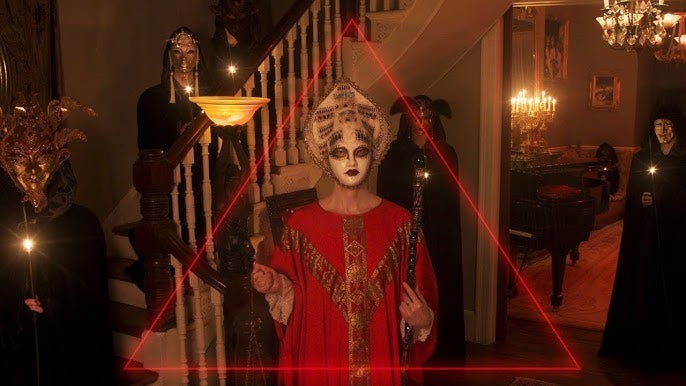It is going to take somewhere in the vicinity of a 2K word essay for me to process this season of The White Lotus, but until such time as that arrives, I wanted to share a couple of things I have been watching/reading during the run of the show.
This season is more explicitly about belief than previous seasons; season one focused on money and desire, season two focused on lust/love/relationships and desire, and this season is about the desire to believe, to heal, to grasp for something more than ourselves. If you’re not a White Lotus watcher, this probably isn’t the season I’d start with (unless you really love existentialism, in which case, you’re gonna eat this up). It is sadder and bleaker, and slower than previous seasons, and the payoffs, while fitting, aren’t satisfying (because the satisfaction of desire is a false idol!). One thread I’ve been tracing throughout this season is the kind of belief systems the guests bring to the table when they arrive. Piper has her nascent Buddhism; Saxon presumably has BroTube and the LIV golf stream. Chelsea is more New Age; Kate has Texas Jesus and Trump. Rick is the most explicitly conspiratorial, but he should have taken Shakespeare for his scripture. They’re all so pulsing with want, so ripe to fall into the tragedies fate has on offer. I’ve found myself drawn to content about how that desire can overreach itself, can fester, can curdle.
Conspiracy by Contrapoints (YouTube): I am a devotee of the cult of Natalie Wynn, the YouTuber known as Contrapoints. Wynn is a philosopher who makes long, delicious, elaborately decorated videos about various deep thought topics. She is one of the most thoughtful people I’ve ever had the pleasure of listening to, and I highly recommend her entire back catalog. Her new video, however, couldn’t be more of the moment. In Conspiracy, she takes us through the American drive to conspiracy thinking, deconstructing why we are so drawn to that mindset and how the impulse to play truth detective has punched a hole in our nation’s ability to think rationally. This video is probably the healthiest three hours you can spend on YouTube.
Blazing Eye Sees All: Love Has Won, False Prophets, and the Fever Dream of the American New Age by Leah Sottile: I watched HBO’s 2023 documentary Love Has Won: The Cult of Mother God because I will pretty much watch any cult-related content. Returning to the story of Amy Carlson, a woman who started a cult around the concept that she was God and died in 2021 in part because she had drunk so much colloidal silver her skin had turned blue, I was struck afresh by how female-coded conspirituality has become. That is the focus of Leah Sottile’s new book, which uses the Love Has Won cult as a jumping-off point to explore the larger environment from which it sprung. Where did Amy’s ideas about Lemuria and colloidal silver and Robin Williams as an angelic guide come from? They didn’t come from nowhere, indeed, many of the ideas that built her following have been kicking around for more than a century, since the advent of spiritualism in the U.S.
Mrs. Davis (Peacock): I reviewed this show when it came out, but I started a rewatch recently, and it sits nicely in conversation with Lotus. From renowned writer/director Damon Lindelof (Lost, The Leftovers, Watchmen) and writer Tara Hernandez (Big Bang Theory), Mrs. Davis is a show about a world where an AI assistant has reorganized the entire world into a state of harmony and peace. This AI, known as Mrs. Davis, has few opponents; a reclusive sect of nuns and a very Proud Boys but not horrible maybe (?) paramilitary group seem to be the only ones left trying to oppose its world domination. One of those nuns is Sister Simone, and it is upon her that Mrs. Davis decides to focus her/its attention. Simone is a nonbeliever in Mrs. Davis and a firm believer in God, so when Mrs. Davis offers Simone a quest that would result in the AI self-destructing, Simone warily accepts. The quest is, of course, a quest for the Holy Grail. Lindelof has always made shows about faith, magic, conmen, and the power of belief, and he brings those focuses to bear on this show wonderfully. His partnership with Hernandez keeps the show with one foot firmly planted in the comedic realm, meaning it is unlikely this show will rip your heart out the way Leftovers liked to do every other episode. But that’s not to say it won’t mess with a few other vital organs, most notably your mind. Lindelof and Hernandez use every tool in their combined toolboxes on this one, and the result is an explosion of meaning and razzmatazz and poignancy. Let this show lead you by the hand; you won’t be disappointed.



